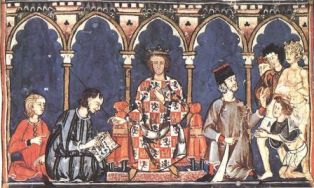Kings and Courts in Middle Ages

Kings and Courts in Middle Ages
The King’s Court
The term “king’s court” refers to the king’s household and council. Everywhere the king went, the court went too. The wise (ideally) men of the king’s court, who would include bishops and other religious officials in addition to relatives and barons and lords, would be consulted for counsel.
Since most rulers held court and rendered decisions, the term “court” originates from this. They would listen to specific grievances and disputes, particularly those involving the most influential barons and lords. After then, they would consult their council before making decisions.

Visiting His Subjects
To get a firsthand look at what was happening in his domain, the king and his court would frequently tour the kingdom. The subjects of the area were supposed to supply lodging, food, and entertainment for the monarch when he arrived. Not all kings were welcome, and this may get extremely costly.
How was a king chosen?
Kings attained their position of authority in many ways. The right to govern was seen as a king’s bloodline in many cultures. A king’s eldest son succeeded him upon his death. We refer to this as hereditary succession. The king’s brother or another male relative might be named king in the event that the monarch had no oldest son. Kings occasionally ascended to power through assassinations or military conquests.
Naturally, a king could not reign without the allegiance of his lords and nobles. These strong men elected the king, in a sense. A council was responsible for selecting the monarch in various nations, such as the Witan council in Anglo-Saxon England.
Coronation
New kings were crowned in a special ceremony called a coronation. During the Middle Ages the coronation was a religious ceremony where a leader from the church, such as the pope or a bishop, crowned the king. Kings were often anointed with holy oil to demonstrate their divine right to rule.
Queens
During the Middle Ages, queens were generally not allowed to be the sole monarch. There were a few exceptions including Empress Matilda of England and Isabella I of Spain. However, many queens held power and influence over the land such as Queen Eleanor of Aquitaine and Margaret of Anjou.
How did kings make money?
Some kings were wealthier than others, but all kings needed money to rule. They had to pay for their daily living needs as well as for armies and wars. Kings collected money in a number of ways. One way was to go to war and pillage other lands. Other ways included fees charged to their lords and taxes levied on the people. Some lords paid the king “shield money” instead of going to war. This way the king could hire his own soldiers for war. Kings had to be careful not to overtax the people or the peasants would revolt.
Keeping Power
Once a person was crowned king, they spent a lot of their time trying to stay king. It wasn’t that easy. Often times there were close relatives and powerful nobles who felt that they should be king. It was especially difficult to manage large empires because it took so long for messages to travel throughout the kingdom. Kings spent a lot of time making sure that their lords remained loyal and didn’t become too powerful.
Facts about Kings and Courts in the Middle Ages
- Taxes were often levied only when the king ran out of money or needed to raise an army for war.
- Many kings during the first part of the Middle Ages couldn’t read or write.
- The kings had a special seal they would use to stamp official documents. The seal proved that the document was genuine and acted like the king’s signature.
- During the Middle Ages kings were expected to lead their men into battle.
- In order to maintain control, kings often claimed they were given the right to rule by God. This made the approval of the church and the pope very important.
Read also: Entertainment and Games in Middle Ages
 The First Encyclopedia Your First Knowledge Home
The First Encyclopedia Your First Knowledge Home
